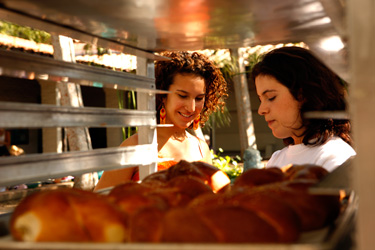 On a quiet Friday morning, a sweet aroma of eggy challah bread whiffs out of the Malott Commons ovens. While most students are sleeping in, India Mullady stands by, patiently waiting to roll out the warm loaves into Seal Court.
On a quiet Friday morning, a sweet aroma of eggy challah bread whiffs out of the Malott Commons ovens. While most students are sleeping in, India Mullady stands by, patiently waiting to roll out the warm loaves into Seal Court.
“We put all 100 loaves in the oven in the morning so they will be hot and fresh for sales. It is intense, warm, and I exit smelling like challah; it stays with me all day,” said India.
As head of finance, India Mullady ’11 is one of three coordinators for Challah for Hunger, a campus organization that sells challah bread to raise money and awareness for hunger and disaster relief. Although she is formally in charge of the upkeep of $5,000 in one semester’s profits, she regards herself in simpler terms.
“When I bring the bread out and everybody oohs and ahhs, I feel like a magician,” said India. “And knowing the money goes straight to people who desperately need it adds to the magic.”
Scripps College may be known for its quiet campus, but its social voice is anything but silent. Challah for Hunger is but one example of a smoothly oiled organization relying on the mutual commitment of its leaders and volunteers to ensure continuity. Frustrated with unbridled injustice on both a local and international level, students past and present have found ways to transform their personal passions into sustainable philanthropic ventures.
Following Challah’s sweet trail, SWEET (Scrippsies Who Endow Edible Treats) Bakery began its operation in fall 2009 under the leadership of Alex Satariano ’12. Founded on the belief that every child deserves to feel special on his or her birthday, the club hopes to soon be baking birthday treats for children living in local homeless shelters.
“I read an article about a mom who got her foster daughter a birthday cake. She burst into tears and felt as if someone cared about her,” said Satariano. “I knew this was something we could do at Scripps.”
Some organizations run smaller scale operations. Babes and Blankets has, for the past few years, run knitting parties every Tuesday and Thursday night, accompanied by challah bread and a movie, for amateur and veteran knitters to create blankets and scarves to be donated to charitable organizations. In the spirit of charity, groups often team up to run events. While hosting 35 Bright Prospect students on campus, the Community Tutoring Program worked with Scripps Admissions, Scripps College Academy, and Challah for Hunger to offer a class session with Scripps Professor Rosann Simeroth, a challah break, and a campus tour. In the classroom, the workplace, and their personal lives, Scripps students have proven that their commitment to activism is more than altruism for altruism’s sake.
For Halley Everall ’10, her activism was the materialization of an intellectual curiosity.
“I participated in the Humanities Institute and was specifically drawn to the topic of bioengineered food,” said Halley. “After the semester, I felt a little hopeless a far as the solutions to GMOs [genetically modified organisms] in food. When Megan Thompson Westgate ’02 told me about the Non-GMO project she directs, I was so excited to find someone who was addressing the problems that I had become concerned about during the Humanities Institute.” The Non-GMO Project is a non-profit collaboration of manufacturers, retailers, processors, distributors, farmers, seed companies and consumers whose common mission is to ensure the sustained availability of non-GMO choices. At Scripps, Megan’s senior thesis, “Conscious Eating Tableware,” was a ceramics work advocating thoughtful food choices and reflected substantial study into the effects of pesticides on the human body.
Year after year, new modes of giving back are conceived, proving that among inspired students, there is no hesitation to innovation.

